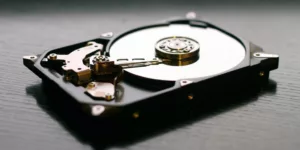Modern laptops can hold an amazing amount of data, including hundreds of thousands of files, hours of video, and thousands of photos. Given their storage capacity, it’s no surprise that millions of users treat their laptops as long-term storage devices. They see the machine’s still have an ample amount of free space, so they pack them full of work files and personal data. Even though the laptop is built with ample storage, it certainly is not built as an ideal storage container.
One spilled cup of Earl Grey, a drop down a flight of stairs, or even static electricity can all damage a laptop and the trove of data it contains. These machines are prone to damage and aren’t built to withstand drops or spills. Once they’re damaged, the data within is also often inaccessible, which poses a particular problem for those who store their entire digital lives on one machine.
Some enthusiastic laptop users will go the DIY route and try to recover data themselves. However, recovering data from a modern laptop isn’t an easy proposition. Older laptops were built with tinkering in mind, and featured easily-accessible screws and removable hard drives. Modern solid state drives (SSDs) found in most laptops are encased within very thin shells that are difficult if not impossible to open. And in many instances the SSD drive itself is soldered onto the board, so they cannot be removed without causing additional damage.
Successfully recovering data from a modern laptop requires an expert hand in the form of a data recovery specialist that understands how to open the machine in a clean environment. The services of a data recovery firm can be a lifesaver, but they should be considered a last resort, since data loss is largely preventable. Here are several best practices for avoiding data loss that can prevent a laptop user from going through the time and expense of professional data recovery:
Fly Data into the Clouds
“Prevention is the best medicine” is an old phrase, but one that’s very apropos when it comes to data protection. Using the cloud as an instantaneous data backup is a simple yet effective way to protect information, and keep it off the of the in-device storage. Pick a well-known cloud service and then simply set it up to constantly mirror files over to the cloud. The laptop can be utilized as a backup, but the cloud should be the main storage receptacle for data. Cloud storage is exceedingly cheap, so consider using a “backup backup” by using more than one cloud provider simultaneously. With the cloud as the storage container, users can treat laptops as a place to run programs and access the internet.
Don’t go DIY
Data recovery utilities are free programs that are littered throughout the internet. They claim to be able to recover data quickly and get the user back up and running within minutes. Unfortunately, these utilities rarely work, especially when they are used to pull data from a damaged drive. And the utilities often are filled with malware that will infect the user’s laptop and pull their personal data, or perhaps install ransomware. In either case, the DIY route is only acceptable for those people who “really really” know what they’re doing, and have direct experience with the field.
Use Available Security Measures
A login PIN on the laptop home screen is a simple yet effective way to stop physical theft of the data. Another is to download and frequently update the best malware and antivirus solutions and use a firewall to stop intruders. And once data is in the cloud, it’s vital to protect the cloud account access with complex passwords and safeguarded credentials. If multiple cloud services are in use, then it’s best to use completely different login credentials for each one. Encryption is a next-level step that is useful for protecting sensitive data throughout its journey from creation on the laptop to transit, to its final destination in the cloud. Encryption renders the files unreadable unless the viewer possesses the right encryption key.
Data recovery is possible, but it’s avoidable. The key lesson here is to be proactive about your data and treat it as a physical asset. It warrants the utmost in protection, and this protection through the cloud and enhanced cyber protection can be had quite cheaply. Used in tandem, these best practices can eliminate the need for costly and time-consuming data recovery, and instead allow users to go about their lives with minimal interruptions.
David Zimmerman has been in the hardware/software industry for over 30 years, specifically in the data recovery software market for 20 years. During this period, he has been involved in the creation; marketing and support of the earlier drive recovery software products to enter the PC market and successfully marketed them both nationally and internationally. His company makes data recovery products for most of his competitors. His experience in the market has made him uniquely familiar with the data recovery business.
LC Technology International, Inc. (http://www.LC-Tech.com) is a global leader in data recovery, file system utilities and data security technology. Clients include original equipment manufacturers, local, state and federal law enforcement agencies, corporate security specialists and IT consultants, among others. Available worldwide and published in more than 24 different languages, LC Technology products are available direct or through several major manufacturers of flash memory products. Founded in 1997, LC Technology is based in Clearwater, Florida.








